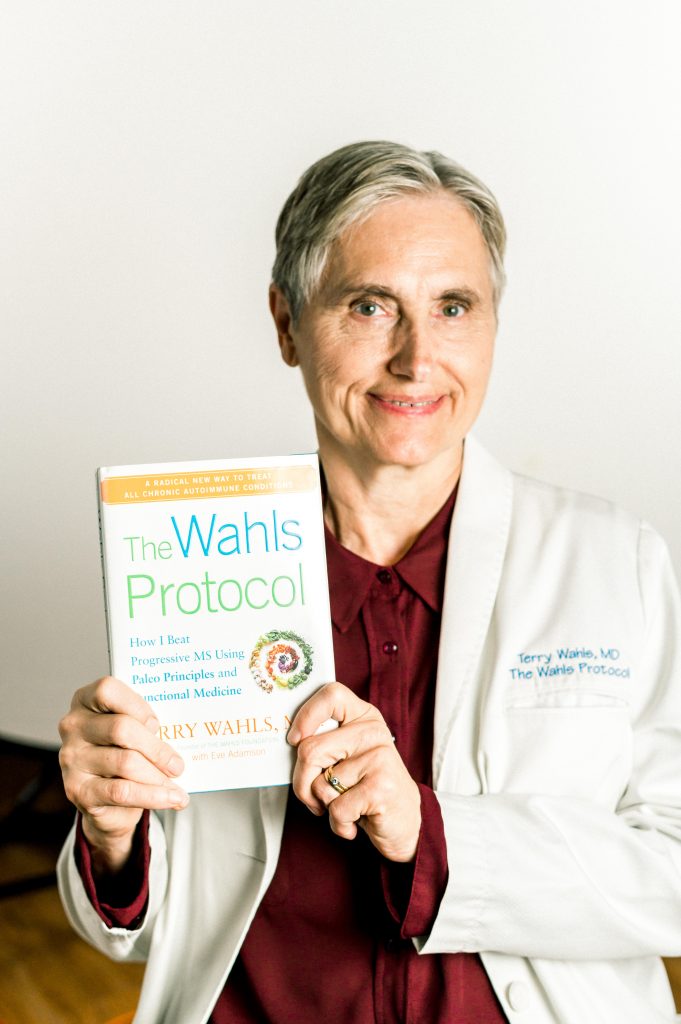
Terry Wahls, MD has some exciting news. She has a new update of her book, The Wahls Protocol. And, very soon, a new study will be released that compares whether a therapeutic lifestyle (diet, stress reduction and exercise) is inferior to disease-modifying drug treatments in terms of reducing multiple sclerosis related symptoms, improving function and quality of life, and reducing the number of acute inflammatory lesions and loss of brain volume.
This study will prospectively assess the changes in quality of life and clinical outcomes in two cohorts of patients who are recently diagnosed with clinically isolated syndrome (CIS) or relapsing-remitting multiple sclerosis (RRMS) to begin answering that question.
As Dr Wahls, author, clinician, researcher and founder of Wahls Protocol, knows from personal experience as an MS patient, the current standard of care typically includes disease-modifying drug treatment at the initial diagnosis. Anything remotely representing a lifestyle approach is very difficult for most patients to achieve largely because there is very little research and protocols for practitioners to follow.
Since some patients decline drug therapy due to high costs and/or concerns about potential pharmaceutical adverse events, there is a strong need for scientific studies that assess outcomes for newly-diagnosed patients who wish to instead utilize only a therapeutic diet and lifestyle to manage their MS-related symptoms.
In her new book, Dr Wahls writes: “Your doctor cannot cure your autoimmune disease. Your medication can only ease your symptoms, sometimes with side effects that make you feel even worse. The power of healing is within you. All you need to do is give your body what it needs and remove what poisons it. You can restore your own health by what you do—not by the pills you take, but by how you choose to live. When you eat and live in accordance with the needs of your cells, your body can finally concentrate on healing, and that is when the dramatic changes will happen for you.”
In this interview with Today’s Practitioner editor, Kimberly Lord Stewart, we discuss this and more with Dr. Wahls.
TP: Can you explain the significance of the upcoming study and why it is important for patients and clinicians?
Dr. Wahls: So, because of the COVID-19 virus, the trial has to be virtual (Today’s Practitioner will have the study results here when available). The original clinical trial was designed to use diet and lifestyle, basically The Wahls Protocol, in newly diagnosed Multiple Sclerosis patients in clinically isolated syndrome patients who’ve been offered drugs and have declined them. The study was designed to instruct and support them on The Wahls Protocol. Then we would compare the Wahls Protocol patients to a cohort of also newly diagnosed MS patients in clinically isolated syndrome patients who are receiving standard of care services.
We were going to do MRIs along with measures of walking, thinking, and vision. However, now we are redesigning the study into a virtual-only study where people are completing a series of questionnaires about quality of life measures. Those who want a diet and lifestyle plan and who have not started disease-modifying drugs will be supported as they implement a diet, meditation, and a walking program, essentially The Wahls Protocol, and we’ll do that all virtually.
The control group will simply follow the standard of care. Both groups will do a variety of questionnaires and a variety of dietary assessments throughout the 12 months. This is really important because it’ll be the first time that we are comparing newly diagnosed MS patients undergoing the the therapeutic diet and lifestyle that is The Wahls Protocol to drug-based disease-modifying therapies. That will be very exciting to see how those two compare.
TP: I’ve heard that in the past you’ve been banned by the National MS Society and now they’re working alongside you. What’s the relationship with the National MS Society and are they helping fund this trial? What else are they collaborating with you on?
Dr. Wahls: I had been banned by the National MS Society as a speaker in 2009 as I was first talking about the importance of diet and lifestyle for managing and improving quality of life.
Since then, as research been published and the mechanisms behind which diet improves health, meditation improves health and exercise improves health, has gained more traction and we’ve personally put out more papers and studies, The MS Society ended up giving us a million dollars to conduct a four-year study comparing the low-fat Swank diet to the Wahls Diet. We’ve got the clinical visits all completed. We’re now in the process of completing the data analysis. Depending on how quickly that data is analyzed, we’ll be able to get that off for presentation at a big international MS meeting, which hopefully will be in the fall of 2020, although perhaps in spring of 2021.
TP: What is the biggest challenge regarding the change in your clinical trial? Since everything will be done virtually, is there anything that may get lost in translation? If so, what are you doing to combat this?
Dr. Wahls: The biggest challenge in the change in my clinical trial well, probably for all of us, is the COVID-19 pan-epidemic, which is making the government put in measures of social distancing, social isolation, restrictions on travel. Therefore the hospital, the university, and our clinical trials had to adapt and re-imagine life in a virtual world. So the biggest challenge that we’re going through is doing virtual assessments for our quality of life assessments. It would have been really great to have been able to do MRIs and have that biomarker.
However, the largest question that’s come about amist COVID-19 is in some ways even more important: Can we do everything virtually? Can we help people implement and sustain a therapeutic lifestyle virtually?
We’ll still be able to compare a diet and lifestyle only group to a drug standard of care group. The advantage is that if we’re able to show the techniques that we use to teach and then help patients adopt and sustain this behavioral change with diet and lifestyle, then this is something that can be scaled. Plus, we would be able to expand this program to more people who perhaps don’t have a big neurology center that includes dieticians on their research team or the clinical practice. It really just makes this much more available.
TP: Do you see virtual trials as the future of medicine? Why or why not?
Dr. Wahls: I think we’ll find that more and more research is going to be done this way. We see virtual encounters as a way to support people will only increase when this is all over. It makes it more available and more convenient for patients and clinicians.
And actually, I think my group in many ways is ahead of the curve because I now have more experience with group visits in that we’ve been doing this in clinical practice for several years now.
TP: I’ve heard you also recently released a new and expanded version of your book. What’s different about this version?

Dr. Wahls: I’ve released a new and expanded version of my book The Wahls Protocol. This new version is about 30% new material. We have a more detailed plan of how people can transition from the Standard American Diet to the Mediterranean diet to the Wahls diet and a more paleo version of the Wahls diet, a ketogenic version, and then a more restrictive elimination diet version. We also talk about histamines. FODMAPS, oxalates, and how to identify any of these issues that might be affecting health.
In this version of my book, we have a much more robust conversation about behavior change relating to food addictions, cravings and strategies that I’ve used in my clinics in my clinical trials to help people grow their internal motivation and work through their food addictions. We’ve expanded the discussion on neuro-rehabilitation, rehab, a little more on electro-stimulation, and more on neuromuscular re-education. We’ve updated the supplement section. I’ve updated the discussion on stem cells, for who stem cell transplants are indicated, where you can get stem cells, the things that we do that suppress stem cells, and why stem cells decline with aging, and the things that we can do to boost the number of stem cells that are in circulation. We talk also talk about metabolic resilience and emotional resilience in the new book.
TP: Any advice for anyone who wants to get their research peer-reviewed?
Dr. Wahls: The first thing I really like to have people do is please write up case reports and case series. They are incredibly valuable to researchers. A new idea, a new observation that you’ve made in a case report, may lead to a case series, which then could lead to a small clinical trial. By just seeing if people can implement that intervention to use in your clinical case report, case series and the effected size gives you valuable insight. Then we go on to randomized clinical trials. Again, the very first thing to do is to write up the case report to indicate series. The other thing that you can do is look at an academic center. Often, there are residents and research fellows who are looking for publication ideas. You may find someone who’s able to be a partner with you in helping to assist you through the publication and writing process.




